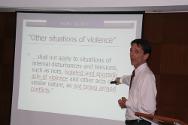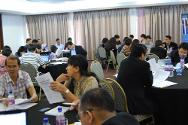Malaysia: South-East and East Asia teaching session on IHL
17-07-2012 Interview
The seventh Southeast and East Asian Teaching Session on IHL (SEATS) will be held in Kuala Lumpur from 15 to 20 July 2012. The course is run by the ICRC and the Faculty of Law of the National University of Malaysia, and brings together over 30 participants from East and South-East Asia. Richard Desgagné, the ICRC’s legal adviser for the region, explained the background to the event.
What is the purpose of SEATS?
Promoting international humanitarian law (IHL) is a core component of the ICRC's mandate. SEATS was created to further this aim by facilitating the teaching, dissemination, and building of expertise in IHL.
Why in Malaysia?
SEATS was first held in Malaysia because the Regional Resource Centre (RRC) at the ICRC’s Kuala Lumpur delegation houses several ICRC specialists working on relevant ICRC programmes. Support from the National University of Malaysia (UKM) was also an important factor. We are currently looking at holding some sessions in another country of the region, still in collaboration with UKM, to promote wider participation.
Who is SEATS for?
These sessions are aimed at people teaching or working in international law and policy, human rights or humanitarian issues, such as government officials, police and armed forces personnel, journalists and NGO staff. We send invitations to academic institutions, government departments and agencies, focusing on ministries of foreign affairs, justice and the interior, plus military and police training establishments.
This year, we have participants from Brunei, Cambodia, China, Hong Kong, Indonesia, Japan, Malaysia, Mongolia, Myanmar, Philippines, Singapore, South Korea, Taiwan, Thailand and Vietnam.
What can participants expect from SEATS?
SEATS is a 30-hour course consisting of presentations on IHL and humanitarian action, discussions on issues arising in relation to armed conflicts and violence, plus case studies and exercises designed to bridge the gap between theory and practice. There are 10 hours of presentations and 20 hours of discussions, practical exercises and case studies.
This year speakers include experts from the ICRC, the Malaysia Joint Warfare Centre, the National University of Malaysia, the International Islamic University and Professor Harry Roque, the Director of the Institute of International Legal Studies, University of the Philippines Law Center, who is so far the only person from Asia who has ever been admitted to practice before the International Criminal Court.
SEATS encourages participants from academia to continue or establish the teaching of IHL in their own countries. The sessions give participants a thorough grasp of the key tenets of IHL and humanitarian action, on which they can base activities in their respective countries.
How has SEATS grown since its inception?
In recent years, we have been seeing more government participants and fewer from academic circles. In 2011, the distribution was roughly 40% academics, 40% government staff and 20% from National Societies, NGOs and the media. But the impact of SEATS stems from the activities that it stimulates, and not from the size of the event .
SEATS has created a network of contacts for ICRC delegations in the region, through which they have been able to support the inclusion of IHL in curricula and engage in dialogue with academic circles and national authorities.
SEATS has been held in Malaysia for the past seven years. Are there plans to expand the Teaching Session to other parts of Asia?
There is no plan to expand the session as such, but we are thinking of holding some sessions in other countries of the region.
In addition, we are planning to enhance follow-up and organize more regular contact with former participants by maintaining a regional former participants’ network. We will also be conducting national sessions or other events with former SEATS participants, in order to reach a wider circle of academics and public servants.
About the event
The ICRC’s Kuala Lumpur regional delegation, in cooperation with the National University of Malaysia's Faculty of Law, will be hosting the seventh annual South-East and East Asia Teaching Session on international humanitarian law from 15 to 20 July 2012.
The aim of the session is to improve knowledge of the law applicable to armed conflicts and other situations of violence, and promote its understanding among the academic community, government officials and civil society in the region. The session consists of presentations on IHL and humanitarian action given by scholars, military experts and the ICRC, together with case studies that enable participants to apply the rules and principles in practice. The case studies are linked to current legal challenges and humanitarian problems and topics include the qualification of armed conflicts and other situations of violence, the protection of detainees, assistance and humanitarian action, the conduct of hostilities, international humanitarian law and the fight against terrorism, and the enforcement of IHL.
The Session is designed for people who teach or work in international law and policy, plus those who deal with human rights or humanitarian issues, such as government officials and personnel of the police, the armed forces, the media and NGOs.


